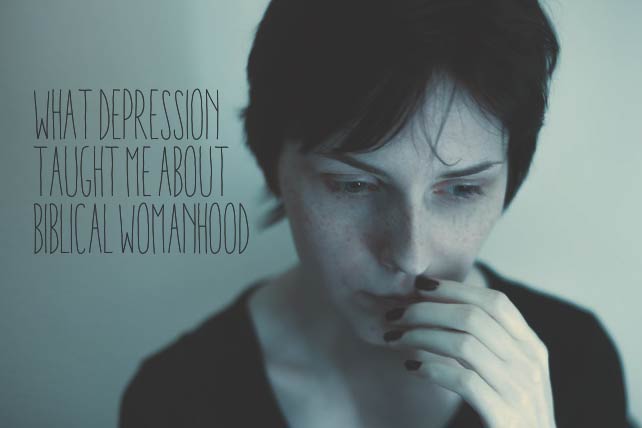I’ve written more on womanhood than I have about postpartum depression.
Part of that is because biblical womanhood is a topic I’m speaking on at an upcoming conference. Also, to coin an overused and sometimes annoying term, I’ve been feeling woke about the topic lately. And, lastly, it’s because talking about PPD, while mostly empowering, is also a vulnerable and scary thing. Everyone has an opinion on depression, and I can’t tell you how many people have critiqued how I tell my own story.
But it’s a real thing. And it’s something that continues to teach me so much about being a woman of God. Because of this, I have honestly been able to say that God used the darkest season of my life (so far) for beautiful purposes (Romans 8:28). Even though that is the last thing I wanted to hear in the midst of my suffering.
Fair warning: This is about to get real.
THE TRUTH ABOUT DEPRESSION
I have never been a very hopeful person. My mom’s nickname for me growing up was Eeyore. The tiniest things could rattle my faith that God loved me and wanted what was best for me. That has always been my struggle.
But after I had my son, those moments of struggle stretched into hours; those hours stretched into months, I felt…adrift. Empty. Disconnected. Like, in sustaining the life of my son—the most beautiful part of me—I had killed the life inside of me.
Depression is different for all of us, but, for me, I felt as though I was drowning in an inch of water. All I had to do was get up. Push hands against the ground, rock back on my knees, and breathe the air that I could feel all around me. And I kept screaming to myself to do just that, but I just couldn’t.
And I was so ashamed because perfect wives don’t deal with depression.
THE TRUTH ABOUT ME
I had spent years leading up to my marriage planning to be a killer wife, y’all.
Sure, I was planning for God’s glory to be my ultimate focus, but that focus was this far off heavenly thing that didn’t seep into my day to day pursuits. No, day to day, God was relegated to my quiet time. Every other part of my waking moments were supposed to be consumed with being the perfect helpmeet to my husband and the perfect mother to my son.
And then I met my husband. He was neither impressed by my Suzie Homemaker skills nor fooled by the veneer of my wifely perfection. We had been dating for about two weeks when I pulled a perfect godly girlfriend move and prayed for him during a hard day. No sooner had I said amen then the blunt man that I would marry quipped,
“That was sweet. But I’m starting to wonder who the real you is under this carefully choreographed perfect girlfriend thing you’re doing.”
I was livid. And convicted. But the first year of my marriage, I was still doing the perfect wife dance and stuffing down the intricacies of my heart in pursuit of this woman who I thought I was supposed to be.
THE TRUTH ABOUT LIFE
But it couldn’t last forever.
My family moved to Zambia. Phillip and I moved to two states in two years. I suffered a miscarriage. We endured the harsh reality that marriage can be tough. And I suffered through postpartum depression.
And I couldn’t pretend anymore.
The articles that beckoned me to do my duty to be part June Cleaver, part Maria Von Trapp and part wide-eyed Disney princess struck hollow. My house was a mess. My marriage consisted of my husband holding me every night while I cried. And my motherhood included looking down into my little boy’s face and anchoring myself in the reality that, sometimes, the only reason I felt the will to live was because he needed me.
THE TRUTH ABOUT BIBLICAL WOMANHOOD
The darkness just wouldn’t lift.
Until one day, it did.
The dark moments in our lives (where our false notions of womanhood are put to the test) are the moments when God is yanking us out of the idolatry of what it means to be the perfect [single, girlfriend, wife, fill in the blank].
It’s impossible.
It is impossible to be the perfectly content single who is never lonely. It is impossible to be the perfect girlfriend who needs less than she gives. It is impossible to be the superwoman who is kicking butt and taking names at work and still has everything to give when she gets home. It is impossible to be the stay-at-home mom who never gets lonely, never thinks her kid is a terrorist, and never fantasizes about pushing her husband off of a (really small, really non-fatal) cliff.
And if you manage to do one of those things perfectly, I guarantee you haven’t held down all of them equally. And if you have, don’t talk to me, girl, take that show on the road and get paid, cause you’re a magical unicorn.
THE TRUTH ABOUT JESUS
For the non-magical unicorns among us, circle up. Hear me on this. The phrase “biblical womanhood” is often a sweet Jesus Juke that silences the discontent that could lead us to the Cross. It hasn’t equipped us for the valleys in life, because it promises that, once we’re meeting our purpose in life as we should, the valleys will melt away.
But I want to invite you to lean into the valleys. They rip our idols out of our hands. They toss us down onto our knees and into a bald acceptance of the fact that we need more than perfect husbands, beautiful children, tidy houses and domestic acumen to be fulfilled in this life. We need Jesus. And not in a “Jesus Juke” kind of way, but in a “this man bled out on a cross with nails hammered into his palms; he knows suffering, and he cares for me” kind of way.
WE WERE MADE FOR MORE
In the 1960s, Gloria Steinem of second wave feminism fame decried the void that stay-at-home moms often felt and urged them to find fulfillment in the workforce. Some of our conservative Christian forebearers shot back by elevating the home and crying that true fulfillment could be found therein.
But whatever season you find yourself in—at home, at work, in school, single, married, childless, drowning in diapers—the void can find you.
It found me.
And it’s a reminder that we were made for better things than what this world has to offer. Better things, even, than our husbands and our children (present or future tense). It’s a reminder that our vision of those better things, while ever improving once we come to know Christ, is sometimes painfully dimmed by the hardships of this earth.
Don’t smile it away. Don’t fake it till you make it. Stare right into the face of the darkness and trust that Christ is sufficient to conquer every little thing that you find inside of it—because he is.
This article originally appeared here.












